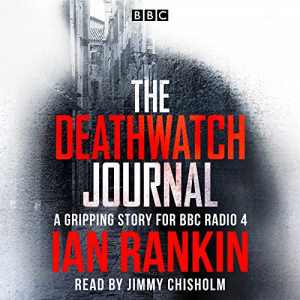The Deathwatch Journal 1/5 (2017)
Čte Jimmy Chisholm.
Natočeno 2017. Premiéra 1. dílu 16. 10. 2017 (BBC Radio 4, 22:45 h.). Repríza 1. dílu 22. 6. 2020 (BBC Radio 4, 10:45 h.) v cyklu Book at Bedtime.
Vydalo BBC Audio, a Division of Random House 7. 12. 2017 (1 CD, ISBN-139781785299179, 75 min.).
Pozn.: A gripping original story for BBC Radio 4 by award-winning crime writer Ian Rankin A gripping original story for BBC Radio 4 by award-winning crime writer Ian Rankin, written for the landmark Radio 4 Book at Bedtime slot Saughton Prison, Edinburgh. 1962. Prison guard Thomas Scott watches over a condemned man sentenced to hang for the murder of his wife. His prisoner is a guilty man, that’s for sure. William Telfer has done enough bad things in his life. And Scott has been in his job long enough to know that guilty men often proclaimed their innocence right up until the moment the noose was placed around their necks. But as they wait out the days until his execution, Scott begins to suspect that Telfer is innocent of this murder. An innocent man could be hanged by the neck until dead. And his jailer doesn’t know what to do about it… To find out the truth, Scott must explore Edinburgh’s darkest corners. And he is running out of time. From the best-selling author of the Rebus novels, this original story asks what you would do in the face of doubt, and in the search for justice. (anotace)
As the death watch progresses, Scott becomes ever more certain that an innocent man is going to the gallows for a crime he didn’t commit, and that even with his impressive list of other crimes, Telfer still deserves justice. Scott’s own marriage is in difficulties, which in some ways makes him want to get to the truth about the killing even more, as he makes a series of excuses to his wife for his frequent absences. His quest for the truth takes him deep into the dark side of the city.
Scott’s suspicions are aroused even further when a conversation with Mr Turpin, the hangman, appears to be warning him off his attempt to see justice is properly served, because if Telfer didn’t kill his wife, then someone else did. But the police are not keen to see Telfer’s case reopened, either, and warnings come thick and fast.
The Deathwatch Journal, written by Ian Rankin as an original story for BBC Radio 4, is narrated by Jimmy Chisholm, who handles a variety of mainly dour voices with considerable aplomb. The story is relatively simple, although not without its twists, as expected from the master of Scottish noir. I quickly became engrossed in Telfer’s story, and it stands as a salutary warning to anyone who believes in the return of the death penalty. Nothing is ever as simple as it might seem, including this tale.
If you enjoyed this post, please consider to leave a comment or subscribe to the feed and get future articles delivered to your feed reader.







Komentáře
Zatím nemáte žádné komentáře.
Napište komentář k článku